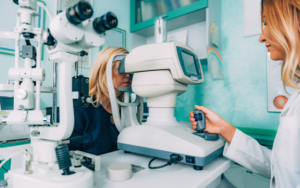
Here are my tips for saving money on various eye care-related costs.
Help with the cost of regular eye tests
It is important to have a regular eye test, at least every two years, to maintain the health of your eyes. The cost of this test could be as high as £30 but more than 30 million people in Britain qualify for free eye tests.
You qualify for a free eye test if you are:
- aged under 16, or aged under 19 and in full-time education
- aged 60 or over
- registered blind or partially sighted
- diagnosed with diabetes or glaucoma
- advised by a doctor that you are at risk of glaucoma
- aged 40 or over and you are the parent, brother, sister, son or daughter of a person diagnosed with glaucoma
- eligible for an NHS complex lens voucher
- in receipt of Income Support
- in receipt of Income-based Jobseeker's Allowance
- in receipt of Employment and Support Allowance
- in receipt of Pension Credit Guarantee Credit
- in receipt of Income-based Employment Support Allowance
- in receipt of Universal Credit (criteria must be met)
- entitled to, or named on, a valid NHS tax credit exemption certificate
- named on a valid NHS certificate for full help with health costs (HC2)
How to reclaim eye tests costs
Free eye tests from your employer if you use a computer
You have the right to a free eyesight test from your employer if you use, or are about to use, Display Screen Equipment (DSE) a lot during work hours. You can also get further free tests if recommended by your optician. If you are prescribed glasses to help you work with DSE, your employer must pay for a basic pair of glasses, provided they are needed especially for your work. Your employer can choose whether they issue a voucher to cover the cost; reimburse the cost once you have paid it or direct you to an optician whose fees they pay directly.
How to reduce the cost of glasses and contact lenses
Don't feel obliged to buy your glasses or contact lenses from the optician that carried out your eye test. The optician must give you a copy of your up-to-date prescription, leaving you free to shop around for the best deals.
When it comes to frames there is a great difference in prices from the basic to designer brands, there are also many online companies that offer good deals. Obviously, buying online presents the problem of not being able to try on your choice of spectacles. Why not then choose your glasses at a high street optician and shop around online for the best price? You can often find great offers and discounts for the same frames and lenses or very similar ones. You'll find two-for-one offers for glasses as well as offers that may include a free pair of prescription sunglasses.
Also, watch out for up-selling by the optician who may offer you special coatings for your glasses, such as anti-glare, anti-scratch and photochromic lenses. You may find these coatings beneficial but they will greatly increase the overall cost.
What help can you get with the cost of glasses or contact lenses?
You may get help with the cost of glasses or contact lenses if you:
- are aged under 16, or aged under 19 and in full-time education or
- are eligible for an NHS complex lens voucher (your optician will advise on your entitlement)
You may also get an NHS optical voucher if:
- you receive Income Support or Income-based Jobseeker's Allowance (not contribution-based).
- you receive Pension Credit Guarantee Credit.
- you receive Income-based Employment and Support Allowance.
- you receive Universal Credit (criteria must be met)
- you are entitled to, or named on, a valid NHS tax credit exemption certificate.
- you are named on a valid NHS certificate for full help with health costs (HC2).
Reducing the cost of contact lenses
Contact lenses can be much cheaper if they are purchased in bulk online, however it is important to only purchase lenses prescribed by your optician. If you are planning to purchase online make sure that you only use reputable companies.
Many opticians will try to sell you a regular order plan that is paid for by monthly direct debit, but this will lock you into using one company and therefore you will not benefit from shopping around.
If you only wear your contact lenses occasionally, you could opt to receive a reduced supply so that you are not paying more than you need to. It is possible to subscribe to monthly, quarterly or even annual deliveries of contact lenses which you can use sparingly as you need in between deliveries.






